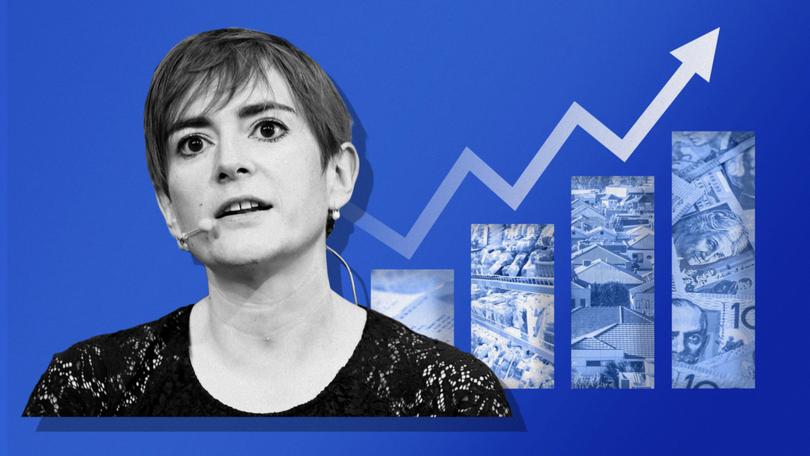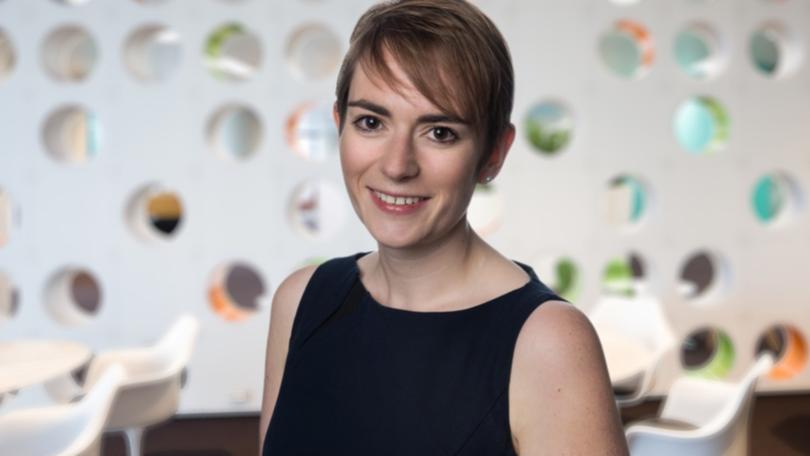RBA chief economist Sarah Hunter backs in Treasury view that electricity rebates will help lower inflation
The Reserve Bank board will keep higher-than-expected inflation centre of its discussions when it meets again in a matter of weeks, with its chief economist warning of strong price pressures across the economy.

The Reserve Bank board will keep higher-than-expected inflation centre of its discussions when it meets again in a matter of weeks, with its chief economist warning of price pressures remaining strong across the economy.
Speaking the day after higher than expected April inflation figures were revealed, Sarah Hunter said working to get inflation lower remained a key priority.
Inflation over the year to April was 3.6 per cent, above expectations for it to be 3.4 per cent and proving it’s particularly sticky.
Sign up to The Nightly's newsletters.
Get the first look at the digital newspaper, curated daily stories and breaking headlines delivered to your inbox.
By continuing you agree to our Terms and Privacy Policy.“Clearly there’s still some strength in inflation and that’s a key consideration for the (RBA) board in their decision-making,” Dr Hunter told an investment conference in Sydney on Thursday. “It’s one of the many indicators that they’re tracking.
“The data did confirm that there’s still strength in a number of categories that we’ve seen up until this point that’s still there.”
Also under consideration is the impact of high interest rates and inflation on peoples’ hip pocket.
“We can see that there are some households and people that are really struggling right now they’re doing it tough,” Dr Hunter said.
Between the RBA’s May and June meetings to date have been the Federal Budget measures, and a raft of State Government stimulus and the April inflation and employment data. Also likely to factor into its discussions at is June 17-18 meeting are the minimum wage decision due from the Fair Work Ombudsman on Monday, GDP and economic growth data due on Wednesday and unemployment data due June 13.
RBA governor Michele Bullock has suggested the bar for another interest rate hike is high, saying earlier this month the board believes the cash rate of 4.35 per cent is “currently restrictive”.
“That doesn’t rule out that we mightn’t have to raise rates but it doesn’t mean we will have to raise rates,” she said at her May media conference.
An interest rate hike would be unpalatable news for the Government. Treasurer Jim Chalmers has suggested measures including electricity rebates, higher Commonwealth Rent Assistance and the Stage 3 tax cuts would work to push inflation lower — a view Dr Hunter broadly backed in.
Treasury now expects inflation could be within the RBA’s target range of 2 to 3 per cent before the end of this year. The RBA’s forecasts — last officially updated pre-Budget, suggest it will be in the second half of next year.
Dr Hunter said: “Broadly speaking, we agree with Treasury’s analysis of what’s going to happen to measured headline inflation as a result of those rebates. That will be incorporated in our next update in August. That’s not to say that’s mechanically what we’re going to do.”

She added the RBA was also constantly watching wages and productivity data, but wages growth was now about peak levels and was starting to soften. Consumer indicators were also soft but there was some suggestion of an uptick soon.
“Overall for households, I think right now it’s still pretty soft spending — we got the retail data last week, that was sort of pretty weak,” she said.
“We are expecting a bit of a gradual pickup through the back half of this year and we think that income growth will outpace wages growth and (the) tax cuts coming through, we think they’ll have an impact too.
“So all of that put together (is) quite a bit of support for household spending. But it will take some time, we’re not expecting an immediate turnaround. And we know right now that spending trend is is pretty weak.”
Dr Hunter also cautioned that the rise of artificial intelligence, and its forecast use for businesses, would not immediately lead to a lift in productivity growth, which has been slow for some years.
“It does take time for these trends to really embed themselves in a business,” she said. “It’s not like you sort of invest in the cloud technology or bring AI and suddenly, it transforms what you do and you’re twice as productive . . . it does take time.”
